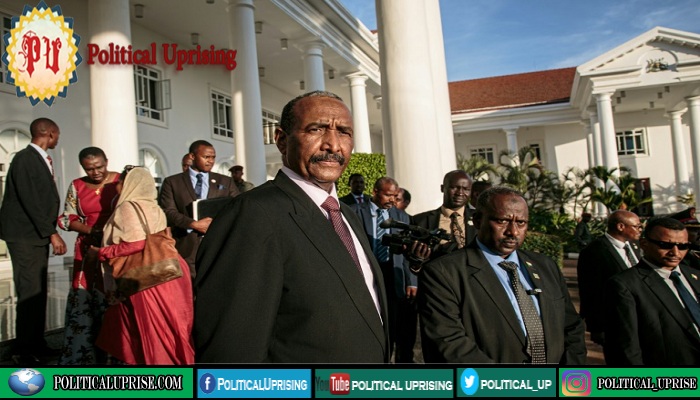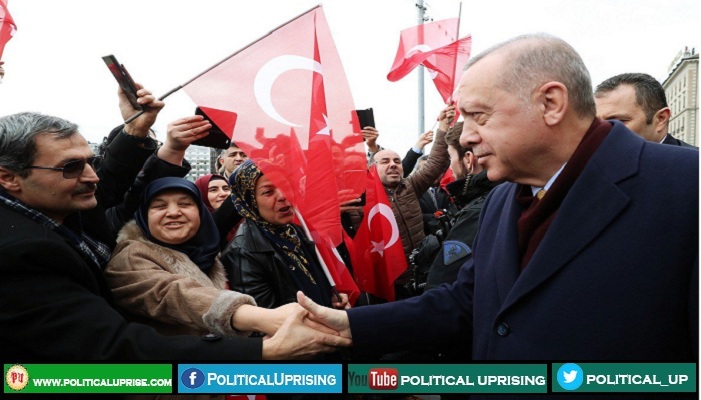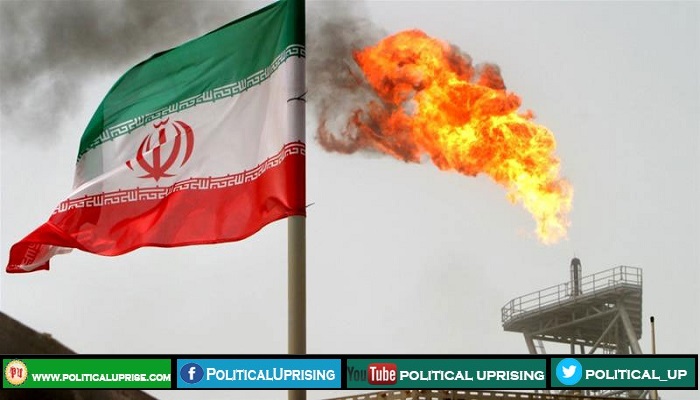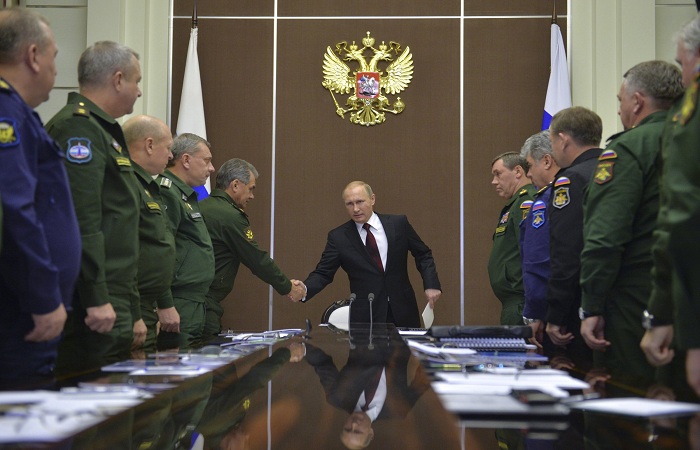Netanyahu was smiling and gesturing as he posed for pictures alongside Museveni,president of Uganda who hosted him in the city of Entebbe on Monday.
Coalition leading anti-Bashir protests accuses sovereign council head of violating Sudan’s constitutional declaration.
Israeli Prime Minister Benjamin Netanyahu was smiling and gesturing as he posed for pictures alongside Yoweri Museveni, the president of Uganda who hosted him in the city of Entebbe on Monday, but it was another meeting, far from the media glare, that made international headlines and raised eyebrows.
In an unannounced move, Netanyahu on Monday also held talks with Abdel Fattah al-Burhan, the head of Sudan’s sovereign council, a joint civilian-military transitional body that has been governing the country since August last year in the wake of longtime President Omar al-Bashir’s overthrow months before.
Read More: Netanyahu indicted for bribery and fraud charges
Following the secret meeting, Israel said the two countries had agreed to move towards forging normal relations. Only two Arab states Egypt and Jordan have diplomatic ties with Israel.
“History!” tweeted Netanyahu, who is fighting for his political future ahead of a snap legislative election on March 2, the third in less than a year.
As news of the talks spread, protests reportedly erupted in Khartoum as Sudanese government ministers insisted they were unaware of the meeting and had heard about it through the media.
Al-Burhan himself only made his first public remarks about it the next day after briefing the council and the cabinet.
“I took this step from the standpoint of my responsibility to protect the national security of Sudan and achieve the supreme interests of the Sudanese people,” Burhan said in a statement on Tuesday.
The meeting came two days after the Arab League, of which Sudan is a member, joined Palestinian leaders in rejecting US President Donald Trump’s Middle East plan, which he unveiled while standing alongside Netanyahu at the White House last week.
The plan proposed a two-state solution to the decades-old Palestinian-Israeli conflict, with a new Palestinian capital outside of Jerusalem while maintaining the historic city as an “undivided capital” for Israel.
From Sudan’s perspective, analysts said the meeting could in some measure be seen as part of efforts to help remove the country from a 1993 US list of “state sponsors of terrorism”, which has cut it off from financial markets and severely harmed its economy.
While the US in 2017 lifted a trade embargo on Sudan, the country’s inclusion in the terror list prevents it from accessing much-needed financial aid and limits potential foreign investment.
“Sudan is experiencing an economic crisis and the transitional council has been struggling to find a real solution to this,” Sudanese affairs expert Said. “Part of the problem, in their view, relates to the designation of Sudan as a state sponsoring terrorism by the US, denying it US financial assistance,” he added.
Read More: Israeli election: Netanyahu shown no sign of willingly giving up his post
Sudanese attempts to lift the country’s terror designation have gained new traction since Abdalla Hamdok, a seasoned United Nations economist, was named prime minister in August last year.
Weeks later, during an address at the UN General Assembly, Hamdok urged Washington to remove Khartoum from the list and “stop punishing” the people of Sudan who revolted against al-Bashir for the crimes committed by his “regime”.
In December, Hamdok repeated his appeal as he became the first Sudanese leader to officially visit the US. But his efforts seem to have not yielded any success, according to a expert. “The prime minister tried very hard for a solution during his visit, but it seems to have reached a deadlock.”
On the other hand, al-Burhan’s efforts seem to have yielded results. In a statement on Monday, US Secretary of State Mike Pompeo welcomed the meeting with Netanyahu and “thanked the Sudanese leader for his leadership in normalising ties with Israel”.
In a phone conversation a day earlier, Pompeo had invited al-Burhan to visit the US, a major ally of Israel. The date of the visit has not been set.
For Israel, the meeting came at a strategic time days after the release of Trump’s plan and amid ongoing efforts to expand its influence across the Middle East and North Africa.
It was also crucial for Netanyahu, who is gearing up to contest the upcoming election while facing trial on corruption charges.
“The meeting is, for Netanyahu, a success for his policies seeking normalisation with Arab and Muslim countries, without concessions on the Palestinian issue,” said Yair Wallach, a senior lecturer in Israeli politics at the University of London.
“Netanyahu is definitely bragging about opening up new spheres of influence ahead of the elections,” he said.
“It’s Israeli propaganda.”
But inside Sudan, reactions to the meeting pointed towards a strong aversion to normalising relations with Israel.
While the cabinet said on Monday it had not been “notified or consulted” about the meeting, the Forces of Freedom and Change (FFC) a coalition of opposition groups that has struck a three-year power-sharing deal with the military condemned al-Burhan’s secret encounter.
In a statement issued after Tuesday’s emergency briefing, the FFC said al-Burhan’s move was “a clear violation of the country’s Constitutional Declaration”, which was signed in August last year to pave the way for civilian rule after the military overthrew al-Bashir in the face of months-long mass protests.
Read More:Israel election caused fluster for Netanyahu
“Fundamental changes to a political issue of such importance, as the relationship with Israel is, should be decided by the Sudanese people through channels that represent them,” the statement added.
News of the meeting also elicited a strong reaction from the Sudanese public, especially among activists who had taken part in the uprising against al-Bashir’s 30-year rule.
“This meeting goes against all our revolutionary principles and what we fought for, for months. The protest movement rejects normalisation with Israel and stands with the Palestinians,” said Hisham al-Shawani, an activist and leading figure in the protest movement.
The Sudanese Professional Association (SPA), which spearheaded the anti-Bashir protests, also slammed the meeting in a statement on Wednesday. “We affirm our complete condemnation and categorical rejection of these practices and any outcomes that resulted from the meeting,” the SPA said.
Separately, a Sudanese official told local news agencies that the meeting between al-Burhan and Netanyahu was orchestrated by the United Arab Emirates (UAE), one of only three Arab states that sent representatives at Trump’s unveiling of his Middle East plan.
While the Entebbe meeting may have been an attempt by al-Burhan to ease Sudan’s isolation from the West, it also reflected a divide within Sudan’s transitional authorities amid growing Emirati influence over the country’s military leaders, according to analysts.
“The UAE seems to be the godfather of the current regime, running Sudanese affairs through relations with the military side of the council,” expert said. “It may have orchestrated the meeting so as to garner Arab support for Israel and Trump’s plan.”
He added that the meeting between al-Burhan and Netanyahu “must be viewed through a prism of the ongoing rivalry between the civilian and military sides of the transitional council”.
“The military side of the transitional authority saw this meeting as an opportunity but, for the rest, they were kept in the dark.”
Read More: Israel Netanyahu seeking support for forming Government
Sudan expert Hamid al-Tigani agreed: “Al-Burhan has his military guys on one side, and on the other side stand the civilian factions.”
According to al-Tigani, if successful, al-Burhan’s move would strengthen the council’s military arm, which might threaten Sudan’s democratic transition and the promised establishment of civilian rule.
“Al-Burhan is very desperate to get support and protection from the UAE and the US, and hopes that by meeting Netanyahu, this will open a little window for him,” he said.
“But this move may strengthen the military’s hand through a mandate from the US and Israel, which may threaten the democratic transition in Sudan and antagonise the Sudanese people.”
Netanyahu-Burhan meeting exposed divides in Sudan.



